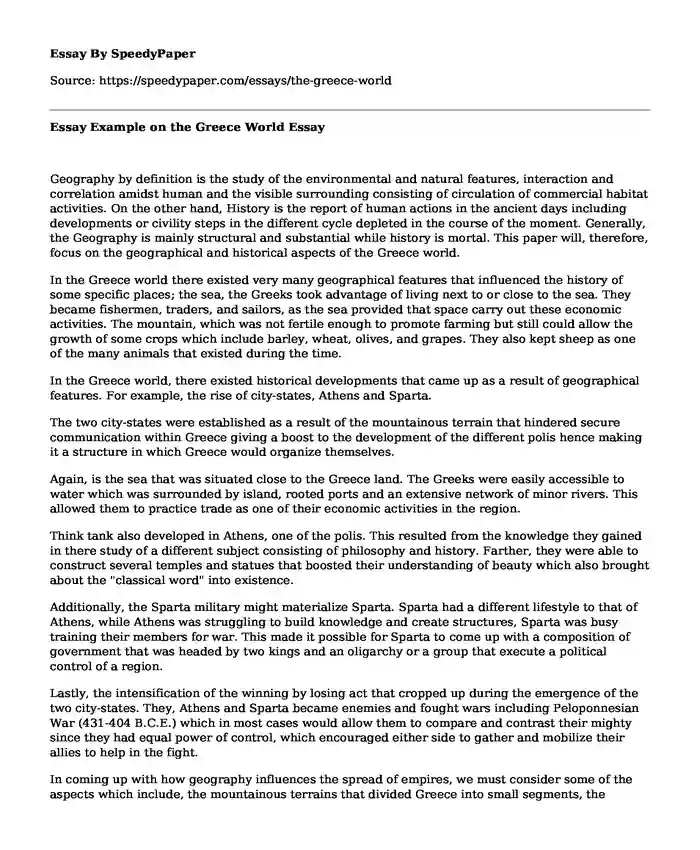Geography by definition is the study of the environmental and natural features, interaction and correlation amidst human and the visible surrounding consisting of circulation of commercial habitat activities. On the other hand, History is the report of human actions in the ancient days including developments or civility steps in the different cycle depleted in the course of the moment. Generally, the Geography is mainly structural and substantial while history is mortal. This paper will, therefore, focus on the geographical and historical aspects of the Greece world.
In the Greece world there existed very many geographical features that influenced the history of some specific places; the sea, the Greeks took advantage of living next to or close to the sea. They became fishermen, traders, and sailors, as the sea provided that space carry out these economic activities. The mountain, which was not fertile enough to promote farming but still could allow the growth of some crops which include barley, wheat, olives, and grapes. They also kept sheep as one of the many animals that existed during the time.
In the Greece world, there existed historical developments that came up as a result of geographical features. For example, the rise of city-states, Athens and Sparta.
The two city-states were established as a result of the mountainous terrain that hindered secure communication within Greece giving a boost to the development of the different polis hence making it a structure in which Greece would organize themselves.
Again, is the sea that was situated close to the Greece land. The Greeks were easily accessible to water which was surrounded by island, rooted ports and an extensive network of minor rivers. This allowed them to practice trade as one of their economic activities in the region.
Think tank also developed in Athens, one of the polis. This resulted from the knowledge they gained in there study of a different subject consisting of philosophy and history. Farther, they were able to construct several temples and statues that boosted their understanding of beauty which also brought about the "classical word" into existence.
Additionally, the Sparta military might materialize Sparta. Sparta had a different lifestyle to that of Athens, while Athens was struggling to build knowledge and create structures, Sparta was busy training their members for war. This made it possible for Sparta to come up with a composition of government that was headed by two kings and an oligarchy or a group that execute a political control of a region.
Lastly, the intensification of the winning by losing act that cropped up during the emergence of the two city-states. They, Athens and Sparta became enemies and fought wars including Peloponnesian War (431-404 B.C.E.) which in most cases would allow them to compare and contrast their mighty since they had equal power of control, which encouraged either side to gather and mobilize their allies to help in the fight.
In coming up with how geography influences the spread of empires, we must consider some of the aspects which include, the mountainous terrains that divided Greece into small segments, the Mediterranean climate, and the fact that Greece topography or domain was aligned towards the sea. These three aspects might have affected their social, economic, and political patterns.
First, the mountainous terrain had broader effects on the Greeks politics and economics as it was split into various sections preventing them from creating a very large polity. This ensured Greece existed as city-states which again had an impact on their economy as it could hardly allow the existence of any overland trade amongst member states.
Secondly, the closeness of Greece towards the sea also helped shaped the economy as it strengthened the maritime trade since the overland trade was impractical. Besides, the Greek government and community at large were also affected, in that, the interaction would later influence the Greece culture through the Mediterranean Sea. As a result, Greece would also protract devising possessions in the existing locations.
Lastly, is the climate that had many effects on the Greece economics and politics. The weather favored the growth of some crops such as olives and grapes. This encouraged the trade between Greece and the locals. The climate also promote interaction and intermingling with each other in the countryside culminating to the creation of a bureaucratic system within the Greece city-states
The Greece world
The map shows a various section of the Greece world on how it was divided and its surrounding environment.
In conclusion, the geographical and historical aspects of the Greeks, in many ways, gave them an upper hand to enlarging their territories and establishing their systems of governance. Solely, they, in turn, advanced both their socio-economic systems.
Work cited
Berger, Eugene, et al. "World History: Cultures, States, and Societies to 1500." (2016).
Boardman, John, Jasper Griffin, and Oswyn Murray, eds. The Oxford illustrated the history of Greece and the Hellenistic world. Vol. 1. Oxford Illustrated Histories, 2001.
Held, David, et al. "Global Transformations: Politics, economics and culture." Politics at the Edge. Palgrave Macmillan, London, 2000. 14-28.
Olson, David R. The world on paper: The conceptual and cognitive implications of writing and reading. Cambridge University Press, 1996.
Cite this page
Essay Example on the Greece World. (2022, Sep 12). Retrieved from https://speedypaper.net/essays/the-greece-world
Request Removal
If you are the original author of this essay and no longer wish to have it published on the SpeedyPaper website, please click below to request its removal:
- Research Paper on Preventing Domestic Violence, Free Essay
- Literary Essay Sample: Victor Hugo of Les Miserable
- Free Essay with Summary of Ethical Dilemma
- Free Essay on the Efforts to Eradicate Racism
- Research Paper Sample for Free: Change Project in Healthcare
- Annotated Bibliography: The Importance of Banning Assault Weapons
- Essay Sample on Ethics of Abortion
Popular categories





